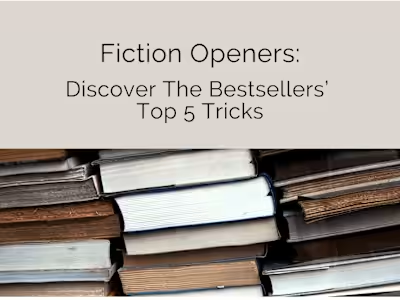Book Rejections: 3 Ways To Go From Rejection To Success

book rejections - woman typing on laptop
Book rejections are more than a dreaded aspect of traditional publishing. For many authors, they are part of the process. Have you ever wondered how many books are rejected each year?
Neil Gordon, formerly an acquisitions editor for Penguin Random House, reveals that publishers reject over 99% of submissions. If that seems mind-blowing, stay with me.
That same editor, actually helped an author—whose work he himself had rejected—land not just one, but two offers from book publishers.
What did she change in her book proposal? How did she go from rejected to successful with the help of just one editor? She implemented a secret many aspiring authors fail to act upon. But first, you may be asking, Why does my manuscript keep getting rejected?
Agents and publishers reject book proposals and manuscripts for all kinds of reasons, including but not limited to a lack of aggressive self-editing; a failure to master the show, don’t tell rule; or even too little time and effort spent on platform building.
Note that while an aspiring nonfiction writer may submit a proposal, first-time fiction writers generally must submit their full manuscripts. Agents and publishers get all kinds of novel ideas, but they must see that you’re able to finish.
And while there are occasional exceptions, most reputable publishers require that nonfiction proposals or novel manuscripts come to them through literary agents. (Discover how to get a literary agent here.)
Here are a few more reasons you might receive book rejection letters:
Proposal rejections
If you’re a nonfiction writer, focus on writing your proposal and first three chapters prior to writing your book in full. This allows a potential agent or publisher to assess your book’s premise and possibilities, offer creative guidance, and accept or reject your idea before you’ve gone to the trouble of writing the entire manuscript.
Potential reasons for your proposal’s rejection:
A small or nonexistent social media platform
Evidence of too many common writing mistakes
A saturated market for your book topic
But don’t be discouraged. Part of learning how to write a book that sells lies in simply refusing to give up and being willing to fix these issues.
Manuscript rejections
Given that most agents and publishers require a completed manuscript for fiction, what might cause your novel to be rejected?A weak writing voice
A lack of relatable human flaws in your characters
A middle that doesn’t match the compelling nature of your opener or conclusion
Miscellaneous other mistakes
So, when this happens, does that mean all is lost and you must give up?
No!
Believe it or not, once you understand why books get rejected by agents and publishers, you can actually use rejection as a launching pad for your writing dreams.
3 ways to capitalize on book rejections
Approach rejection with a growth mindset and it can become one of many steps to success. Some book rejections became famous because their authors refused to give up and wound up massively successful. More on that later. Meanwhile…
1. Try not to take rejection personally
I know that’s not easy, but it’s crucial. Our words on a page are about as personal as things can get, and while learning how to write a book takes time and practice, learning to assess book rejections takes time as well.
Early in my writing career, a mentor advised me to wait 24 hours before even inwardly responding to a rejection.
This allows me to:
Process the rejection
Refocus
Professionally apply any counsel that came with it
My heart gets a free roller coaster ride in the seconds it takes to scan an email from a publisher. “Maybe this is it!”
But if it’s a rejection, naturally I’m deflated. “I’ll have to keep trying.”
Then my heart rises and/or plummets again, depending on any specific feedback.
We writers are human. That’s why it’s healthy to take a day or so to process a rejection.
When you’re able to dispassionately evaluate the input, move on to step two.
2. Determine what to implement versus ignore
Many book rejections arrive as form letters, like::
“Sorry, your project is not a fit for us at this time. Best wishes on your publishing journey!”
But on occasion you may receive personal feedback. View this as the gold mine it is. Feedback is rare and should be taken seriously. Choose to:
Do your best to take it as professional, not personal
Take off your writing hat and replace it with your reader hat
Carefully consider both the positive and negative feedback
Say an agent or a publisher’s acquisitions editor writes:
“I loved your idea, but unfortunately I could not relate to your protagonist and so the story did not capture me. I’m going to pass, but best wishes!”
After spending weeks, months, if not years, on your manuscript, this feedback can feel crushing. You may be tempted to defensively reject the rejection. Don’t. Take a step back, allow some time to pass, and ask:
What aspects of my story might have failed to capture the reader?
What might have made the agent or editor find my protagonist difficult to relate to?
What might be missing in my story world?
Take to heart even the slightest feedback with which you resonate.
When I was new to writing, a beta reader sent me a polite but pointed email stating that he did not like my protagonist.
While, naturally, that was not what I wanted to hear, eventually I realized it was exactly what I needed to hear. After rereading some scenes, I agreed with him. My protagonist simply wasn’t likable.
I made a lot of changes, and now my rejections often include something positive about my protagonist.
What about conflicting input?
Choosing which feedback to implement and which to reject can make you or break you as an author.
One publisher may say your world building bogs down your story while another says you need more such details.
In the end, it’s your creation and up to you to make the final creative decisions.
Just be sure you’re open to professional input and run your choices past a trusted writer or writing mentor.
Always think reader-first and trust your gut to do what’s best for yourstory.
The former acquisitions editor, Neil Gordon, whom I mentioned above, found of the woman he was advising that “her value as an author was based not on her originality, but on her ability to fulfill the needs of her reader.”
3. Make your changes quickly
In How long does it take to get a book published, you’ll learn how slowly the wheels of publishing roll. So don’t dawdle over the changes you choose to implement.
One of the largest contributing factors to becoming a successful author is executing feedback in a timely manner.
This also applies to implementing:
Tips for building your author platform
Lessons you learn at writing conferences
Invitations to submit to a particular agent or publisher
Manuscript details you know you should change
Successful books originally rejected by publishers
Do you feel too many publishers have already rejected you? Don’t despair. Some of the most widely rejected books of all time were written by authors who are now household names.
Example: Stephenie Meyer
She queried 15 agents, 14 of whom rejected her Twilight series, which has sold over 160 million copies to date.
Example: Stephen King
His debut novel, Carrie, suffered30 rejections. His wife Tabitha actually retrieved it from his wastebasket and convinced him he had something. Carrie has sold over 350 million copies.
Example: Frank Herbert
Dune was rejected 23 times, and the publisher who finally accepted it was actually known primarily for their automotive manuals. That’s right, the bestselling science fiction novel of all time…
Example: J.K. Rowling
She simply refused to give up despite 12 rejections of Harry Potter and The Sorcerer’s Stone before Scholastic took a chance on it.
I wasn’t going to give up until every single publisher turned me down, but I often feared that would happen. —J. K. Rowling
How do you turn rejection into success?
Rather than viewing rejection entirely negatively, see it as a spotlight revealing areas for improvement. When you envision rejection as a help rather than a hindrance, you keep trying.
Rejection doesn’t have to be a dream killer if it becomes part of the process of learning your craft.
Sure, we’d all rather be discovered as the diamonds in the rough we believe ourselves to be. And we read stories of overnight successes. But those become newsworthy because they’re so rare. Rather than feeling defeated, learn all you can from any input.
That’s also a good reason to enter writing contests. Whether you win, place, or don’t show at all, devour whatever feedback you get from the judges.
Focus on the process, creating healthy writing habits, and falling in love with writing.
An overnight success is ten years in the making. —Tom Clancy
Accept rejection as part of the process
Just as falling and getting back up is how we learn to walk, bouncing back from rejection is how writers learn to become authors.
Look for common themes
If several agents or editors reject your manuscript and mention the same reason, obviously something needs to be fixed. By the same token, if several mention they loved a particular aspect of your story, you know you’re on the right track.
While it may feel overwhelming to see receive several rejections, you can actually use them to transform your writing.
I once worked with an editor who helped me change the middle portion of my manuscript. She found my beginning and ending strong, but the middle needed help.
I’m so thankful for editors who reject my manuscript and explain why.
Feedback is the compass for greatness; it tells you what to avoid, what to learn, and where to excel. —Henrik Ceder, Chief Growth Officer at Netigate
If the idea of changing your story nauseates you, keep your original draft just in case. My first draft came in at a massive 130,000 words, and I had no idea this was unacceptable.
After submitting to a manuscript critique, I chopped 30,000 words. I felt better knowing I could keep my original draft and perhaps use it for something different in the future.
There’s a fine line between heroic persistence and foolish stubbornness. Sometimes the best kind of grit is gritting our teeth and turning around. ―Adam Grant, bestselling author of Give and Take
Consider a writing coach
Working with a mentor can transform your writing, but make sure you are on the same page about what you need and what they offer.
If you’re seeking to publish traditionally, publishers assume they are assessing your writing, not the editorial work of someone else.
My editor offered guidance and comments that drastically improved my story, but I made the changes myself. This ensured that a publisher received my writing alone.
If you are the smartest person in the room, you are in the wrong room. ―Confucius
Reassess
Regularly review how far you’ve come and whether you’re still going in the direction you want to.
Ask:
Is my current strategy working?
Am I devoting enough time and effort to achieving my dream?
Are there other things I should prioritize?
Hard work can lead to long-term success, but hard work doesn’t consist of working only toward your dream.
Family responsibilities and relationships, friendships, and your bond with your significant other take commitment as well.
Jerry Jenkins says: “Never sacrifice your family on the altar of your writing career.”
You won’t always get what you strive for, but you will definitely get what you settle for. You won’t magically outperform your standards. —James Clear, Author of “Atomic Habits”
Refresh, and begin again
I speak from experience when I say it can be difficult to step away from the keyboard. But often a break allows me to view my writing from an entirely new perspective.
When I return, typos jump out at me. Plot holes look like caverns. Details like forgetting to make a character’s shirt wet after a swim light up.
Persistently attack your daily word count. Meet your deadlines.
But when you need it, don’t be afraid to take a break. Your writing will still be there.
Each person deserves a day away in which no problems are confronted, no solutions are searched for. Each of us needs to withdraw from the cares which will not withdraw from us. —Maya Angelou
Change your perspective
The mindset you choose can determine your success or failure. While a grit and growth mindset often leads to success, focusing on a quick win frequently leads to burn out.
A new writer wants to learn how to become an author. So she:
Joins a writing community
Engages a writing mentor
Queries agents
Believing an agent or publisher will soon discover her, she grows discouraged when rejections pile up.
A few months into her writing journey, she burns out and gives up.
But a simple change in her mindset would have kept her in the game.
Believing an agent or publisher will eventually accept her, when rejections pile up, she recognizes she is that much closer to finding the right home for her manuscript.
To change ourselves effectively, we first had to change our perceptions. —Stephen Covey, Author
How committed are you?
In every creative journey there comes a point where the time invested outweighs the cost of quitting. If you are years into your writing journey and still haven’t landed that book deal, it’s too late to give up on your goal.
Continue to take constructive criticism and make necessary changes to your manuscript. If agents continue to offer positive comments despite passing on your writing, press on.
How you respond to rejection gauges your commitment. How many does it take to dissuade you from continuing? The answer is up to you.
You don’t know what your abilities are until you make a full commitment to developing them. —Carol Dweck, American psychologist
Never, never, never give in
Successful books originally rejected by publishers found success only because the writers refused to quit.
Choosing to accept constructive criticism and press on separates published authors from mere dreamers.
Dreamers talk about writing; writers write and turn their dreams into reality.
I would advise anyone who aspires to a writing career that before developing his talent he would be wise to develop a thick hide. —Harper Lee
Face rejection head-on
How many rejections must you endure before landing your first contract? Hopefully few, but persistence is paramount.
Kathryn Stockett’s The Help, was rejected 60 times.
Jack Canfield and Mark Victor’s Chicken Soup for the Soul was rejected 144 times.
Every rejection letter can be an opportunity to reinforce your publishing dream.
Bestselling author of Atomic Habits, James Clear, says “life rewards action, not intelligence.”
Refuse to give up.
Sarah Rexford (sarahjrexford.com) is a Search Engine Optimization copywriter and editor writing for influencers from an entrepreneur on Forbes 30 Under 30 list to a New York Times bestselling author. She also speaks at conferences with keynoters such as novelists Chris Fabry and Charles Martin. Sarah also writes YA dystopia fiction.
Like this project
Posted Jan 18, 2024
Created this search engine optimized article for 21-time, New York Times bestselling author, Jerry B. Jenkins. This article appeared on his author website.
Likes
0
Views
1
Tags



